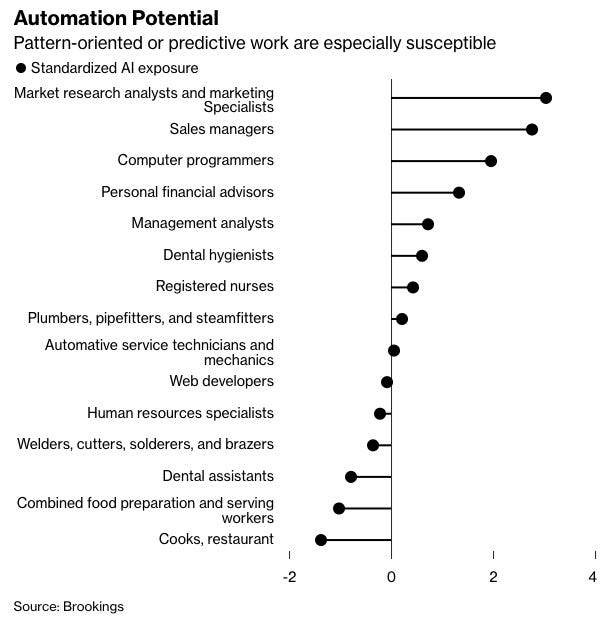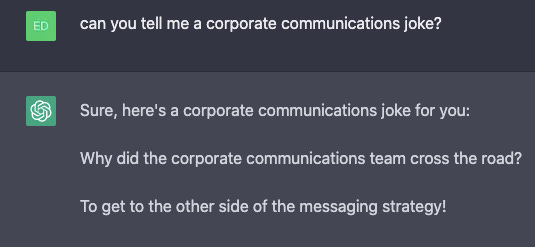This edition of Mister Editorial was written by a human.
A cheeky intro, but don’t be surprised if that sentence becomes a standard disclaimer for non-obvious communications. (Obvious comms is already being written by bots.)
Team Robot
Talking about how artificial intelligence (A.I.) will affect the comms profession is quickly becoming cliché. Many have formed early opinions on how A.I. will transform or elevate or revolutionize or destroy our profession, pick your scenario.
I’ve been testing A.I. for comms since last summer and I have a lot to say about the technology—its pros and cons for our kind.
But the conversation feels saturated, thanks to the explosive (and emotive) reaction to ChatGPT, so I’m taking a light(ish) approach today. Maybe another time I’ll share my deep dive.
Suffice it to say, I’m firmly on the side of leaning into A.I. It’s a game-changer.
But there’s no need to rush to A.I.+comms because technology is in flux. New tools will come online this year and next and will be tweaked and tweaked again, giving you ample time to sample. (Besides, nobody ever accused Comms of being too quick to embrace technological change 😉.)
You must take time to understand the technology, its advantages, disadvantages, benefits, and dangers.
But if you ignore A.I. you do so at your professional peril.
I encourage you to explore A.I. technology, to experiment with it over a long period (not just a couple of hours or days), and to really think about how the tech can affect your work and our profession.
Then take your position at the barricades.
Start With These Basic A.I. Tools
ChatGPT: We will demarcate life before and after ChatGPT.
Bing with ChatGPT integration: The new Bing is now my preferred search engine.
DALL-E (from OpenAI, the maker of ChatGPT) and Midjourney: For image generation. Honestly, Midjourney is much better, but it requires a Discord account and I’m too lazy to figure that part out 🤣.
Perplexity AI: Use it as ChatGPT’s “second pair of eyes.”
Lex: An A.I.-powered writing tool. Let me know if you need an invite.
Quick Hits
A few interesting resources of late:
Generative A.I. Can Help You Tailor Messaging to Specific Audiences (HBR)
The Deep Tech Penetration and How It Is Affecting Public Relations (Adgully)
After ChatGPT, Internal Communications Will Never Be the Same Again. Here Is Why. (Jonas Bladt Hansen)
A video animated with A.I. (Semafor)
Writing With Machines: How A.I. Will—and Won’t—Change Writing (Nathan Baschez)
Watch Your Back
First they came for the blue-collar workers. Not so long ago people were up in arms about how robots were going to replace good-paying manufacturing jobs. And rightly so. A study by MIT found that, in the U.S., “each additional robot added in manufacturing replaced about 3.3 workers nationally, on average.”
Or maybe the fears were overblown. According to the World Economic Forum’s Future of Jobs Report 2020, 85 million jobs may be displaced by the shift in labor between humans and machines by 2025, while 97 million new roles may emerge.
Now it’s time for white-collar professionals to get nervous—that includes comms professionals. Research from Michael Webb at Stanford and from The Brookings Institution shows that “workers with graduate or professional degrees will be almost four times as exposed to A.I. as workers with just a high school degree.” The report acknowledges that manufacturing jobs will continue to be affected by advancements in A.I., but also:
Our analysis shows that A.I. will be a significant factor in the future work lives of relatively well-paid managers, supervisors, and analysts.
Internally, “social A.I.” technology can be used to identify influencer employees, thereby facilitating the flow of ideas and information through the organization, according to a 2022 report by Deloitte.
Social A.I. can improve the quality of work, increase employee engagement, and reduce attrition, says Deloitte. General Motors has done a pioneering study.
Rote work (e.g., reading and filtering thousands of resumes, B2B social) is being done by A.I. now, so if anything HR and Marketing will see the first cuts because of automation.
Externally, research released this week by CIPR shows there are 5,855 A.I. tools that have the potential to be applied to the public relations practice.
When they first did the study in 2018, the researchers predicted that by 2023 (this year) 38% of PR practitioners’ skills could be done using A.I. tools. That study analyzed just 200 applications.
So imagine where PR and A.I. stand today ~6,000 tools. Could 50% or more of PR skills be done by bots?
How much of your comms work is repetitive and formulaic? Could something like ChatGPT or Jasper do the job “good enough”?
“By very definition, artificial intelligence is going after those tasks that require human intelligence,” says Florenta Teodoridis, an associate professor at the USC Marshall School of Business. That can make it difficult “to imagine what’s going to be left over for people to do.”

As I said above, ignore A.I. at your peril.
Or, then again, maybe the fears are overblown.
“I might not ever get a PR email from a human again.”
— Casey Newton speaking on the Hard Fork podcast.
First Draft

I asked ChatGPT to compose a memo announcing layoffs. Specifically, I asked:
Draft a memo announcing a workforce reduction of 12% citing economic headwinds, recession, and supply chain issues for a heavy machinery manufacturer with a serious but confident tone in fewer than 600 words.
In seconds, the bot typed out 356 words:
Note that the bot says a town hall meeting is coming up, a meaningful suggestion if it hadn’t crossed your mind to set one up for this scenario.
Much has been written about how ChatGPT spits out generic text, and there are reasons for that. I won’t get into the technology here.
But…but…
If you’re staring at a blank page because your brain is fried…or you’ve never confronted the topic before (our CEO was just arrested for drunk driving)…or because you don’t know how to say something new about an annual activity (hello open enrollment and culture months), then ask ChatGPT for a head start. (It’s not so different from a writing prompt.)
By the way, here are a few actual memos from top CEOs announcing layoffs that I presume weren’t written by chatbots (for Mister Editorial’s paid members🔒):
Interesting Opportunities
Search for jobs with a description of “artificial intelligence + corporate communications” and you’ll find…nothing.
The interesting opportunity here is that by becoming an A.I. guru in our field today you can create this category and own it tomorrow.
“A.I. Communications Consultant” has a very nice ring to it.
Dad Bad Joke
I asked ChatGPT for a laugh.
[collective groan] 🙄
And that was one of the funnier responses!
🤖 Onward, human commes-rades!
Thank you for being a part of Mister Editorial.
Read past editions of Mister Editorial here.
If you’re enjoying what you’re reading, please consider recommending it to others. They can sign up here. Browse the most popular content here.
Have feedback? Send me a note at editorshaun@gmail.com. Connect with me on LinkedIn and Twitter.
Disclaimer: Besides running Mister Editorial, I am the editor-in-chief of Digital Publications at Lam Research. The views in this newsletter are my own.








